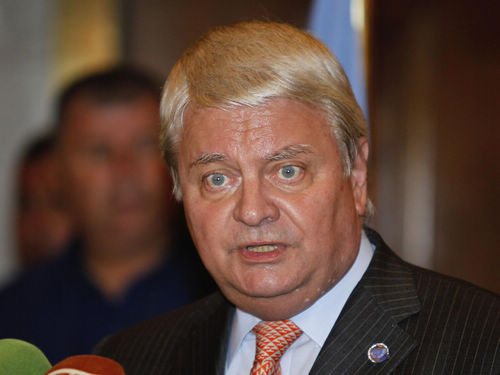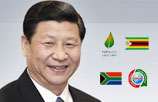Clashes across Syria of great concern to UN
(Xinhua) Updated: 2012-07-27 09:53
 |
|
UN Under-Secretary General for Peacekeeping Herve Ladsous speaks during a news conference in Damascus July 26, 2012. [Photo/Agencies] |
DAMASCUS - Intense clashes have been reported in a number of Syrian areas, particularly in northern Aleppo province as the UN Under-Secretary-General for Peacekeeping Operations, Herve Ladsous, said Thursday that what's happening now in some Syrian cities including Aleppo is of great concern to the United Nations.
After severe clashes with armed rebels, government troops on Thursday regained control and dislodged rebels from the neighborhoods of Salahuddien and Sakkari in Aleppo, media reports said, adding that battles and skirmishes continued in other neighborhoods of the province, which is considered as commercial hub of the unrest-stricken country.
Meanwhile, the oppositional Britain-based Syrian Observatory for Human Rights said the Salahuddien neighborhood was heavily shelled by government troops.
Another activists' group, Local Coordination Committees, said that shelling has also been reported in Damascus' suburb of Daraya and the town of Dael in southern Daraa province.
The activists' account couldn't be independently checked.
The clashes in Aleppo started last week after rebels dealt a strong blow to Damascus but failed to bring down the capital. Media sources said that more than 3,000 rebel fighters had been killed in the Damascus clashes.
Political experts said rebels have tried to bring down the capital, buoyed by the blast that ripped through a meeting of high- ranking officials and pillars of the regime of President Bashar al- Assad over a week ago. They said that after the blast the intensity of clashes have ramped up in Damascus in order to capitalize on the blast, however, the cohesion of the Syrian army and the qualitative operations that have been undertaken in such a short time have put an end to the rebels' ambition to subdue the capital.
Even though the intensity of clashes has largely petered out in Damascus, some pockets of armed rebels have yet to be totally cleaned.
Meantime, state-run SANA news agency said the Syrian authorities chased on Thursday an armed group at the suburbs of the northeastern city of Deir al-Zour, killing five "terrorists" and wounding 10 others.
In Daraa, the Syrian forces clashed with an armed group that had tried to attack law-enforcement agents, killing one terrorist and wounding several others, according to SANA.
SANA also reported clashes between Syrian forces and terrorists in the outskirts of the central province of Hama, adding that heavy losses were inflicted upon terrorists and seized their weapons.
As Syria blames the 17-month unrest on armed terrorists backed by a foreign plot, Syrian President Bashar al-Assad on Thursday issued a law providing for establishing a court to look into terrorism-linked issues with its headquarters in Damascus.
The law provides for the possibility of establishing more other headquarters when necessary by a decision from the Higher Judicial Council.
The court has jurisdiction over civilian and military personnel.
Meanwhile, the visiting UN peacekeeping chief said Thursday that "what one hears and what one sees, the very high levels of violence, here in Damascus, in Aleppo, in Deir al-Zour and in Homs, is indeed something of great concern."
He said that "we will try our best to contribute towards finding the solutions but the solutions, especially the political solutions, must exist in a framework and in a process that will be Syrian owned and Syrian led."
"Unfortunately, as of today, I cannot say that we see many indications that a decrease in violence will happen overnight. I say again, Syrians killing Syrians is something that should not continue," he said.
Ladsous said he has had during the past two days many meetings with officials from the government and personalities from the opposition.
"What I want to tell you is that the UN is committed to implement the mandate of the Security Council," he said.
"The goals of the United Nations is first to contribute to a cessation of violence and that indeed has been my call to all my interlocutors that everything should be done to reduce and put an end to the violence and that includes of course the use of heavy weapons by official forces," he said.
He stressed that everything should be a contribution to the political process, adding that the only way to start the political process for the time being is to stick to the UN special envoy Kofi Annan's six-point plan of Annan. "There is no alternative to that," he said.






